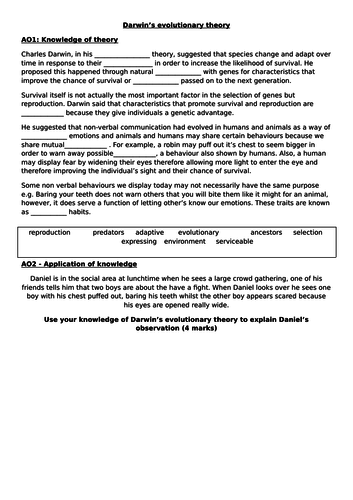

Resource is part of the Language, Thought and Communication topic within the GCSE AQA Psychology specification.
An engaging and student led lesson covering Darwin’s theory of non-verbal behaviour. This fully differentiated lesson is designed to gradually build on student’s knowledge whilst simultaneously developing examination skills. Previous students have found this lesson very accessible with assessments showing a good understanding of Darwin’s theory.
Get this resource as part of a bundle and save up to 61%
A bundle is a package of resources grouped together to teach a particular topic, or a series of lessons, in one place.
GCSE Psychology Language, thought and communication WHOLE BUNDLE
BUY THIS WHOLE BUNDLE AND SAVE 48%! Bundle includes approximately 15 lessons worth of content covering the whole of the language, thought and communication specification for the new AQA GCSE Psychology qualification. Each lesson includes a variety of activities, the majority of which are differentiated and regularly assesses AO1, 2 and 3 through a combination of AfL and summative assessment. Appropriate video clips are used throughout to contextualise and consolidate learning whilst engaging starter activities encourage students to think analytically and hypothetically about relevant content.
AQA GCSE NEW SPEC Psych - Lang, thought and communication - Nonverbal communication bundle
61% SAVING!!! UP TO 10 LESSONS WORTH OF CONTENT (some content spans more than one lesson)<br /> <br /> Bundle includes lessons and worksheets and assessment material into:<br /> <br /> Introduction to communication, difference between animal and human communciation<br /> Difference between verbal and non-verbal communication<br /> Body language<br /> Eye contact<br /> Personal space<br /> Yuki's key study<br /> Darwin's evolutionary Theory<br /> Exam technique lesson focusing on nature-nurture debate.<br /> <br /> Generally, this lessons include opportunities for independent and collaborative work, the inclusion of videos to contextualise content, a strong focus on exam technique and exam style questioning, the development of AO1, AO2 and AO3 skills, differentiation of key activities and regular assessment opportunities.
Something went wrong, please try again later.
This resource hasn't been reviewed yet
To ensure quality for our reviews, only customers who have purchased this resource can review it
Report this resourceto let us know if it violates our terms and conditions.
Our customer service team will review your report and will be in touch.
